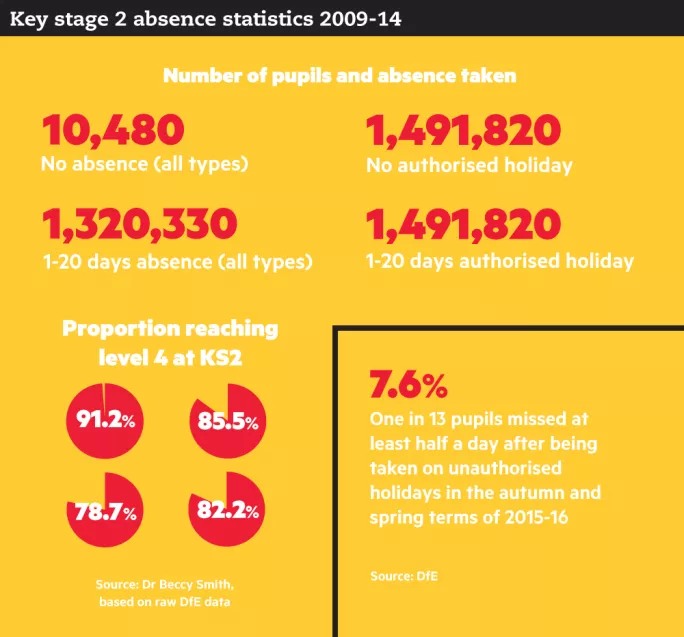Can term-time absences really affect attainment?

Authorised term-time holidays have little impact on primary pupils’ attainment and may even be linked to better performance in tests, according to findings seen by TES.
Academics who have scrutinised Department for Education data say that the figures undermine the government’s “mind-boggling” clampdown on term-time holidays, which is currently being contested in the courts.
The DfE has repeatedly claimed that each day missed from school can harm pupils’ attainment. Since September 2013, heads have been allowed to authorise term-time absences only in “exceptional circumstances”, which do not usually include holidays.
Earlier this year, the DfE published key stage 2 and KS4 data, which schools minister Nick Gibb said provided “further evidence that missing school for even a day can mean a child is less likely to achieve good grades, which can have a damaging effect on their life chances.”
However, two scientists have separated the figures for authorised term-time holidays from the broader dataset used by the government, which includes other absences such as those related to illness or exclusion.
They have concluded, independently, that authorised holiday absences are not linked to poorer attainment at KS2.

In addition, the data shows that pupils who take no authorised holiday absence at all are less likely to reach level 4 at KS2 than those who take at least one day off for a family trip during term-time.
The analysis was carried out by Beccy Smith, a theoretical physicist with two primary-aged children who are educated partly at school and partly at home. She said that her research threw doubt on to the government’s “mind-boggling” claims about the effects of school absences.
Dr Smith focused on KS2 because her children were at that stage. “I thought it was particularly unbelievable that taking them out of school for one day to go to a museum could have any effect at all,” she explained.
Restricting absences ‘is unfair’
Restricting absences was “unfair” for pupils whose parents worked during weekends and holidays, she added. In addition, siblings who attended schools in different counties - such as those who lived near borders - might break up for the holidays on different dates.
It’s unbelievable that one day out to go to a museum could have any effect
Alan Barr, a physicist involved with the ATLAS experiment at the Large Hadron Collider, has been looking at school absence data in his own time. He agreed that Dr Smith’s analysis showed that “overall reduced attainment at KS2 is correlated strongly with illness, but not with agreed holidays”.
Pupils who take no authorised holiday absence at all “are likely to do worse than those who do take at least one day”, he added.
Professor Barr is engaged in a long-running Freedom of Information battle with the DfE, to obtain evidence for the government’s claim that a single day’s absence affects pupils’ GCSE results. The DfE’s responses have failed to prove that absence from school actually causes lower attainment, he said.
The FOI request stemmed from Professor Barr’s interest in how evidence is used to form government policy. The DfE insisted that its own research, unlike the scientists’ findings, took into account prior attainment and other “pupil characteristics” and showed unequivocally that every extra day missed was associated with a lower attainment outcome.
However, a detailed report attached to this same research also pointed out that “agreed family holiday absence has no statistically significant effect at KS2.”
John Coe, information officer at the National Association for Primary Education, said that missing days from school in Year 6 could be problematic because of the government’s “obsession” with assessments.
“It would leave an enormous hole in their knowledge when they come to sit the tests,” he added. “But, for general growth and enrichment, a holiday is likely to be very helpful.”
More leeway for schools to permit term-time holidays would be widely welcomed, he said.
However, Russell Hobby, general secretary of the NAHT headteachers’ union, said the best way to ensure children were learning and progressing was for them to attend school during term-time.
“It is true that the problems associated with repeated absences like truancy and occasional absences like holidays have become conflated,” he added. “But schools have to treat children and families fairly; they cannot have one rule for some and another for others.
“It is not possible for school leaders to guarantee that absences requested by parents will actually result in educational experiences.”
The Supreme Court is due to announce imminently whether it will hear the case of parent Jon Platt, who is fighting Isle of Wight Council after being fined for taking his daughter out of school for a family trip to Florida.
The council, backed by the DfE, plans to appeal a High Court ruling that found in favour of Mr Platt not paying the penalty fee.
A DfE spokesman said: “The evidence shows that every extra day of school missed can affect a pupil’s chances of achieving good GCSEs, which has a lasting effect on their life chances - vindicating our strong stance on attendance.
“A child who is absent also impacts teachers, whose planning of lessons is disrupted by children missing large portions of teaching.”
You need a Tes subscription to read this article
Subscribe now to read this article and get other subscriber-only content:
- Unlimited access to all Tes magazine content
- Exclusive subscriber-only stories
- Award-winning email newsletters
Already a subscriber? Log in
You need a subscription to read this article
Subscribe now to read this article and get other subscriber-only content, including:
- Unlimited access to all Tes magazine content
- Exclusive subscriber-only stories
- Award-winning email newsletters